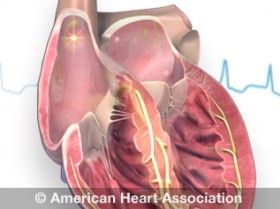Atrial fibrillation (also called AFib or AF) is a quivering or irregular heartbeat (arrhythmia) that can lead to blood clots, stroke, heart failure and other heart-related complications. Some people refer to AF as a quivering heart. An estimated 2.7 million Americans are living with AF.
Here’s how patients have described their experience:
“My heart flip-flops, skips beats, and feels like it’s banging against my chest wall, especially if I’m carrying stuff up my stairs or bending down.”
“I was nauseated, light-headed, and weak. I had a really fast heartbeat and felt like I was gasping for air.”
“I had no symptoms at all. I discovered my AF at a regular check-up. I’m glad we found it early.”
What happens during AF?
Normally, your heart contracts and relaxes to a regular beat. In atrial fibrillation, the upper chambers of the heart (the atria) beat irregularly (quiver) instead of beating effectively to move blood into the ventricles. About 15–20 percent of people who have strokes have this heart arrhythmia.
 “Anything that allows blood to slow down or pool increases the risk of clotting, and so increases the risk of stroke,” says Dr. Steve Roach, Professor of Neurology and Director of the Comprehensive Epilepsy Program at Wake Forest University Medical School. If a clot breaks off, enters the bloodstream and lodges in an artery leading to the brain, a stroke results.“ This clot risk is why patients with this condition are put on blood thinners. People with atrial fibrillation have an increased stroke risk of about five percent per year.”
“Anything that allows blood to slow down or pool increases the risk of clotting, and so increases the risk of stroke,” says Dr. Steve Roach, Professor of Neurology and Director of the Comprehensive Epilepsy Program at Wake Forest University Medical School. If a clot breaks off, enters the bloodstream and lodges in an artery leading to the brain, a stroke results.“ This clot risk is why patients with this condition are put on blood thinners. People with atrial fibrillation have an increased stroke risk of about five percent per year.”
It’s the most common “serious” heart rhythm abnormality in people over the age of 65 years. Even though untreated atrial fibrillation doubles the risk of heart-related deaths and causes a 4–5-fold increased risk for stroke, many patients are unaware that AF is a serious condition.
According to the 2009 “Out of Sync” survey:
- Only 33% of AF patients think atrial fibrillation is a serious condition
- Less than half of AF patients believe they have an increased risk for stroke or heart-related hospitalizations or death
AF Treatment Saves Lives & Lowers Risks
If you or someone you love has atrial fibrillation, learn more about what AF is, why treatment can save lives, and what you can do to reach your goals, lower your risks and live a healthy life.
If you think you may have atrial fibrillation, here are your most important steps:
- Know the symptoms
- Get the right treatment
- Reduce risks for stroke and heart failure
We’re here to help you live your healthiest life!
AFib Materials — Join our efforts to increase adherence to AFib guidelines and bridge AFib knowledge gaps by ordering or downloading your FREE Atrial Fibrillation materials and more for healthcare professionals and patients!

